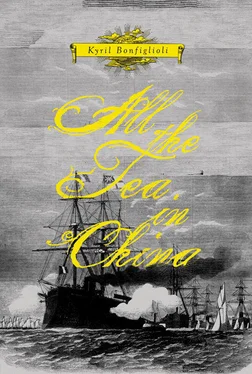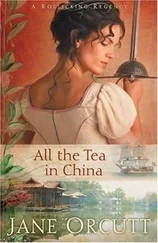“Never hoped to see you alive again, Mr Dutch, my dear young cock! And wot’s this, wot’s this? Your lady wife? Charmed, I’m sure: ‘none but the fair deserves the brave’ as Nimrod himself has said. You shall come home with me this werry hinstant to meet Mrs J., who I do not doubt will find some scrap of a snack to furnish us out until dinner-time.” We did so. Mrs J. burst into tears at the sight of me: for a moment I feared that she would fold me to her bosom. Luckily, Mr Jorrocks presented Blanche to her at that moment, so that it was Blanche who received the enfolding, the kindly, copious tears and the maudlin sayings of “there, there” and “you poor thing, you,” etc., while Mr Jorrocks and I stole away to where the good, strong Marquess of Cornwallis lay in black bottles under the dining-room sideboard.
I did not see Blanche again until dinner, when she plied almost as lusty a knife and fork as I did, for she had rested, you see. It was a frugal dinner, Mr Jorrocks explained, because we were but four at table and there had been no time to arrange “made dishes”. A tureen of gravy-soup and a stuffed pike were “removed” by a round of boiled beef at one end of the table and a crown-roast of mutton at the other; the corner dishes were but a brace of green geese and another of Aylesbury ducklings; nevertheless, we fared well for we were used to worse, and the black puddings, ragoût of kidneys and pigeon pie which came with the sweet things as second course were barely touched.
When the women had retired to drink those potent, sticky drinks which women drink in drawing-rooms, Mr Jorrocks fetched out two decanters of a port which he himself had only once before broached, he vowed. The two decanters were because he professed himself too old and tired to push decanters the length of a table: it was easier to have one each. It was capital port. Later, Blanche and I slept between lavender-scented linen sheets, smothered luxuriously in feather beds. There was never so happy a man as me that night and Blanche, too, gave every sign of contentment with her lot.
There was, of course, no question of taking such another little shop as I had once kept — so many centuries ago, it seemed — near Strand Street and the Convent Gardens Cabbage Exchange. In those days I had been but a poor, ignorant Dutch Jew; I was now a rich , ignorant Dutch Jew, for I owned the finest stock of porcelains in Europe as well as the modest amount of gold I had thoughtfully rescued from the specie-room of the John Coram . For running expenses I went to a Dutchman in Hatton’s Garden — which is a street, not a garden at all, and where you could linger a week without hearing a word of English spoken — and sold my splendid baroque pearl. I was robbed, of course, robbed, but £485 (plus a sovereign with which to buy sweet-meats for my non-existent children) shewed a good profit on my purchase price from the base of the base Indian, and in any case it has always been my philosophy to leave a profit for the next man.
Not only had I to seek out a more grandiose shop but also one with elegant living-quarters, for I now had a wife and, as everyone knows, wives require drawing-rooms, water-closets and many another fal-lal and folderol. At last we found an ideal place: Mr Jorrocks advised me that an acquaintance of his (“for ‘friend’ vould be stretching the Henglish language a leetle,” he said) had recently gone to Queer Street. This “Queer Street” is an affectionate term used by Londoners to denote Carey Street, where the Commissioners in Bankruptcy sit magisterially the live-long day, striving to teach debtors and creditors to live together in amity. It is a strange, British institution and many a fortune has been founded by prudently resorting there. I have heard it said that a sensibly-planned bankruptcy can be as profitable as a well-insured fire.
Be that as it may, Mr Jorrocks’s acquaintance, a Mr S. Sponge, had “failed” in his business, which was called the SPONGE CIGAR & BETTING ROOMS, by advertising that he had £116,500 to lend at three and one half per centum — a madness which only a Gentile could perpetrate.
The cigar divan, which we went to inspect that very day, was furnished in the most gentlemanly taste: replete with crimson plush, gilt plaster simulating carved wood, ottomans in bottle-green velvet; red mahogany and crystal chandeliers: one might have thought oneself in Waddesdon itself. It was going for a song and I snapped it up in a trice; that is to say, after little more than three hours’ bargaining with the agent for the creditors. It was situated in a quiet, not too dirty little street called Jermyn which runs parallel to the unfashionable end of Piccadilly (where the more genteel whores ply their trade) and is in the Parish of St James’s. But why do I tell you this, for have I not often taken you to see where our House was founded, and where it throve until, needing more space, I bought the Duke’s house at the Corner of Hyde Park?
The upstairs apartments were spacious and elegant for such a seedy neighbourhood and Blanche declared herself well pleased. Then, at her insistence, we went a-shopping. Our first call was at the Foundling Hospital, where I bought another bastard, explaining that Orace had ungratefully run away to sea. The new boy seemed sturdy, willing and with clean fingernails. He was happy to leave the Hospital, for his work there was to scrub floors for ten hours each day, except on Saturdays when he was leased out to a “Sabbath goy”, who is a man who contracts to light fires for orthodox Jews on that day and to do other tasks forbidden in Leviticus.
I was generous with Blanche and I am bound to admit that she laid out the money well on bedding, furnishings, wall-papers and clothes for herself. Her taste in drawers, stays and smocked petticoats I found exquisite and she discovered an innate gift for removing them in my presence in the most charming way. It was interesting to observe that, as her store of finery increased, so did her saltiness; indeed, there were nights when even I was hard-pressed to match her salacious inventiveness. I believe it was at about that time that I bought her, as a sentimental present, a charming little terrier-whip, the lash bound with green velvet and a silver fox’s head on the handle. She had, it proved, not quite out-grown such toys.
I think that, on the whole, I am glad that I shall never understand women. There are some areas of knowledge which we men are better without.
My mother had sent, in care of Mr Jorrocks, a couple of chests of excellent Delft and other wares; these, along with some of the less important items from my cases of Chinese porcelains, furnished forth the still-shuttered windows of my new establishment against the day when I should open for business and astonish the London connoisseurs.
There came a day when the new clothes which I had ordered were delivered and the modest, but not quite tradesmanly, carriage was promised for the morrow. I sent a note to Lord Windermere craving, in a dignified way, permission to wait upon him the following day. The note came back with a scribbled. “Pray do, but you’ll find me bedridden” on it.
Before this visit, something upsetting happened: when signing the papers for the new bastard I had noted that his first name was “Hugh” and had, accordingly, been addressing him as “Hooch”. He came to me and explained, most respectfully, that this name was in fact pronounced “You” in English. I was quite taken aback and told him that this would never do. He admitted to owning a second name — Thomas — and we agreed on this — an excellent name for a bastard.
When the new carriage, drawn by a fine half-bred Hackney bay, was delivered, Tom walked around it in the most knowledgeable way and gentled the horse like any ostler (which is short for oatstealer, of course). He shyly claimed that he knew how to drive such a conveyance and I allowed him, with some trepidation, to prove his skill. He was, indeed, gifted in the art and I sent out forthwith for a suitable hat and leggings for this capable little dandi-prat.
Читать дальше












